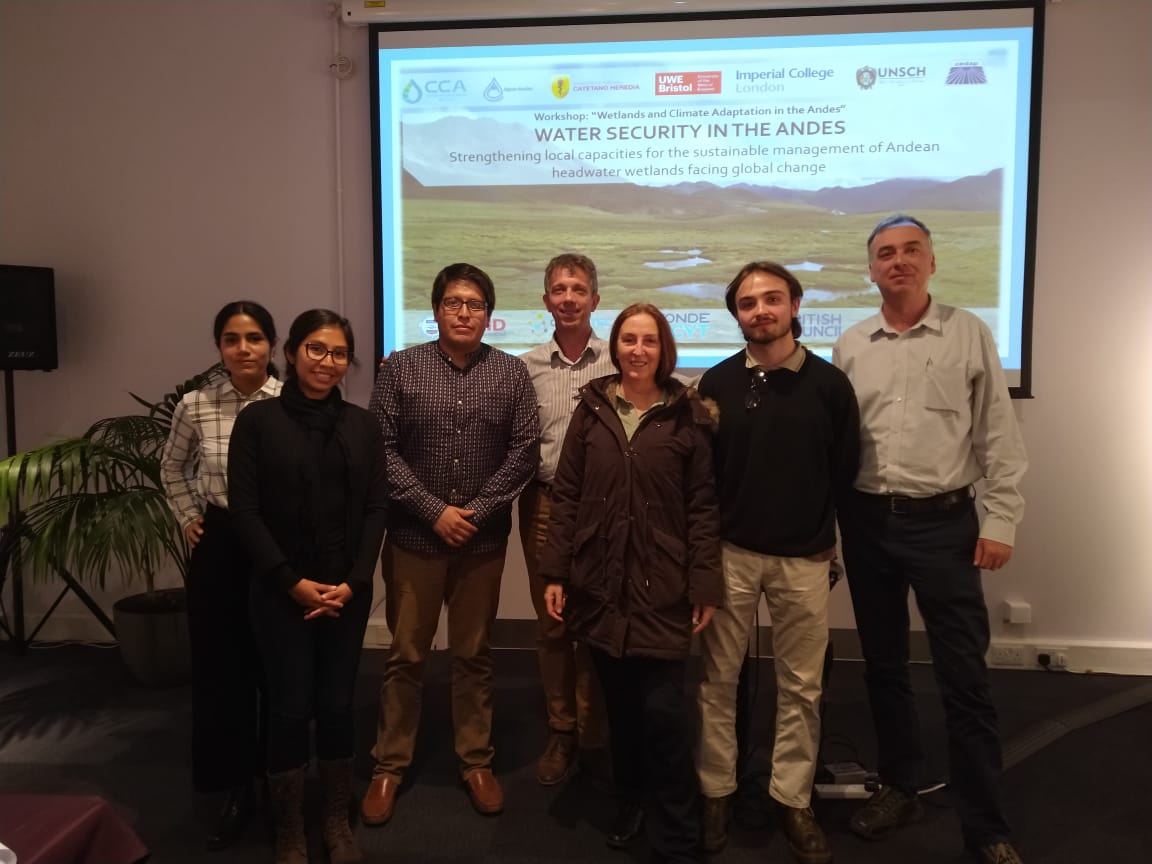 On 28-30 January 2020, researchers from the University of the West of England (UWE Bristol), Centro de Competencias del Agua (CCA), University of Bristol and Imperial College London (ICL), plus indigenous leaders and other interested academics, came together for the ‘Environment and society in the Peruvian Andes’ workshop in Bristol. The workshop marked the end of the year-long project Strengthening local capacities for the sustainable management of Andean basin headwaters wetlands facing global change, which was supported by an Institutional Links grant under the Newton-Paulet Fund partnership.
On 28-30 January 2020, researchers from the University of the West of England (UWE Bristol), Centro de Competencias del Agua (CCA), University of Bristol and Imperial College London (ICL), plus indigenous leaders and other interested academics, came together for the ‘Environment and society in the Peruvian Andes’ workshop in Bristol. The workshop marked the end of the year-long project Strengthening local capacities for the sustainable management of Andean basin headwaters wetlands facing global change, which was supported by an Institutional Links grant under the Newton-Paulet Fund partnership.
During the first two days, the team directly involved in this project took time to discuss their research and its results, and plan for future collaborations, especially between UWE Bristol and CCA. One of these possible collaborations will complement CCA research on the design of drinking water supply systems. Despite significant efforts and advances, Peru still has a gap in access to drinking water especially in the rural areas, where 25% of the population do not have access to water supplied by public network.
On the second day of the workshop, Wouter Buyteart (Imperial College London) gave a presentation on the ‘Natural Infrastructure for Water Security’ (project info here). The increasing revaluation of Andean technologies based on ancestral knowledge, accompanied by scientific evidence of their effectiveness, means natural infrastructure is an important response to the challenge of adaptation to climate change. In Peru, these responses have been promoted in a favourable institutional and legal framework.
The final day of the workshop was devoted to wetlands and adaptation to climate change in the Andes, and took a comprehensive look, from a socio-ecosystem perspective, at the results of the linked projects. The first presentation was given by Jemma Wadham and Raul Loayza, who lead the CASCADA project. In addition to strengthening the collaboration between the Peruvian University Cayetano Heredia and the University of Bristol, this project aims to investigate, and generate solutions to, the cascading impacts of glacier retreat in the water quality of the rivers of the Cordillera Blanca. The team will use monitoring technology to record in situ, for the first time, river water quality data throughout the year and will develop and test a new wetland management model to remedy rivers with high metal toxicity.
Next, Bram Willems (CCA) discussed the Newton-Paulet Fund project and the possible follow-up activities that will see the methodologies designed by the team being replicated, as well as the proposed solutions being implemented. Martín Leyva Molina and Rossi Taboada (CCA) presented the results of this project, and the complementary studies that will strengthen the analysis of wetland ecosystems. As well as attending the workshop, both Martín and Rossi extended their stays in the UK, in order to develop academic visits at the Imperial College London and UWE Bristol, respectively.
Mark Everard (UWE Bristol) gave a presentation in which he emphasized the methodology of ‘rapid evaluation of wetland ecosystem services’ (RAWES), and Chad Staddon (UWE Bristol) disucssed the Household Water Insecurity Experiences (HWISE) scale and its application in more than 25 countries. This instrument aims to assess the physical and non-physical dimensions of water insecurity at a scale that had not been considered among existing metrics.
There was also a valuable presentation by Reynaldo Mariqueo, Coordinator of the Mapuche International Link, who explained how these native peoples have been affected by climate change, and the privatization of water. At the end of the day, Karen Bell (UWE Bristol) highlighted the struggles of the Bolivian people against the privatization of water and, in this context, the understanding of water security linked to the ‘good living’ approach.
The Institutional Links grant under the Newton-Paulet Fund allowed CCA and UWE Bristol to develop research on fragile Andean ecosystems in Peru. Future activities will be aimed at continuing these efforts, strengthening the information generated for the proposal of actions that contribute to the maintenance and improvement of these ecosystems.
***
This work was supported by an Institutional Links grant, ID 413987121, under the Newton-Paulet Fund partnership. The grant is funded by the UK Department for Business, Energy and Industrial Strategy and CONCYTEC and delivered by the British Council. For further information, please visit www.newtonfund.ac.uk
